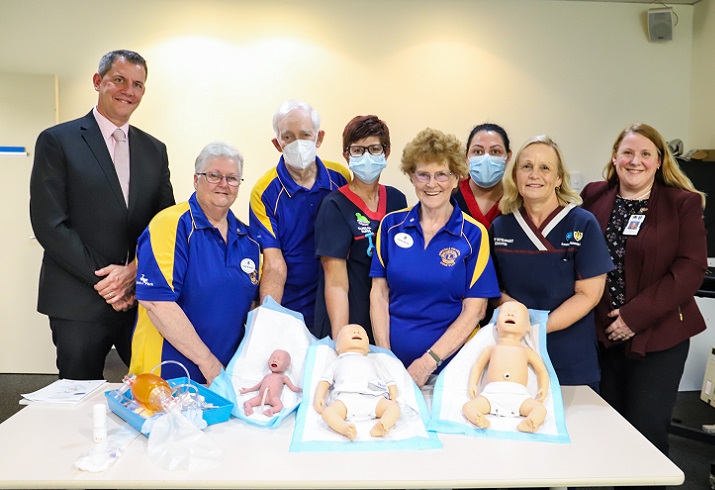Baby bonus thanks to Lions Club

The Armadale Kalamunda Group (AKG) recently accepted another generous donation from the Armadale Kelmscott Lions Club, and this week, held a small event to thank the club for its continued support.
The club’s latest donation is of two infant manikins and an anatomically correct manikin of a 25-week-old premature baby called ‘Premature Annie’ to the Armadale Hospital Paediatric Department.
Hospital staff and AKG Executive came together yesterday to formally accept and inspect the new manikins while discussing the importance of high-quality simulation training with Lions Club members.
A/Executive Director Neil Cowan warmly welcomed the Lions Club Armadale Kelmscott visitors, including Club Secretary Sue McFarlane, former Club President Murray Witham and club member Davina Watson.
“It’s an absolute pleasure to have you here, to acknowledge and thank you officially for your generous donation,” Neil said.
“Thank you on behalf of the whole Armadale community for everything you do, raising funds for such important projects, and in particular, for these paediatric simulation manikins that will be important assets for our simulation teams.”
Davina officially presented the manikins along with their birth certificates to Paediatric Consultant Dr Fuad Abass.
“It is so wonderful being here today to see the manikins in person and hand them over to you, after two years of hard work by our volunteers to raise the funds needed,” Davina said, adding that two of the manikins had been named after Lions Club founder Melvin Jones and Helen Keller, the inspiration for the Lions Eye Institute.
Fuad explained just how vital such simulation manikins were in the provision of high-quality care.
“Having manikins of this calibre that can simulate real-world events is so important, because it means our staff can have the best possible training and preparedness,” he said.
“Having the ability to ensure staff maintain their skills is also important, so when we are confronted with a real baby with a medical emergency, they can feel confident in their treatment and care.”
Fuad and his team then demonstrated a simulation training using Premature Annie – while those in attendance watched on with bated breath – ending with a round of applause at the successful intubation of the manikin.
Already in use for simulation training, the three manikins, which have been automated to provide real-time and real-life patient responses, are being used for education in many aspects of care.
AKG Staff Educator Jane West confirmed the manikins have already been put to good use and are improving paediatric simulation training on site.
“The training for staff in clinical areas enhances experiential learning,” Jane said.
“Staff are able to practise their assessment and treatment skills while getting real time response and feedback from the ‘patient’ through the physical presence of pulses and respiratory sounds to add to the fidelity of the scenario.
“The manikins were also used recently for the paediatric study day, targeted at staff from various areas around the hospital who look after paediatric patients.”

